Broccoli is a nutrient-dense cruciferous vegetable that supports whole-body wellness through its rich profile of vitamins, minerals, fiber, and antioxidants.
Regular consumption may help protect against oxidative stress, support immune function, and promote digestive and cardiovascular health. Understanding its science-backed benefits can help you make informed dietary choices that align with long-term health goals.
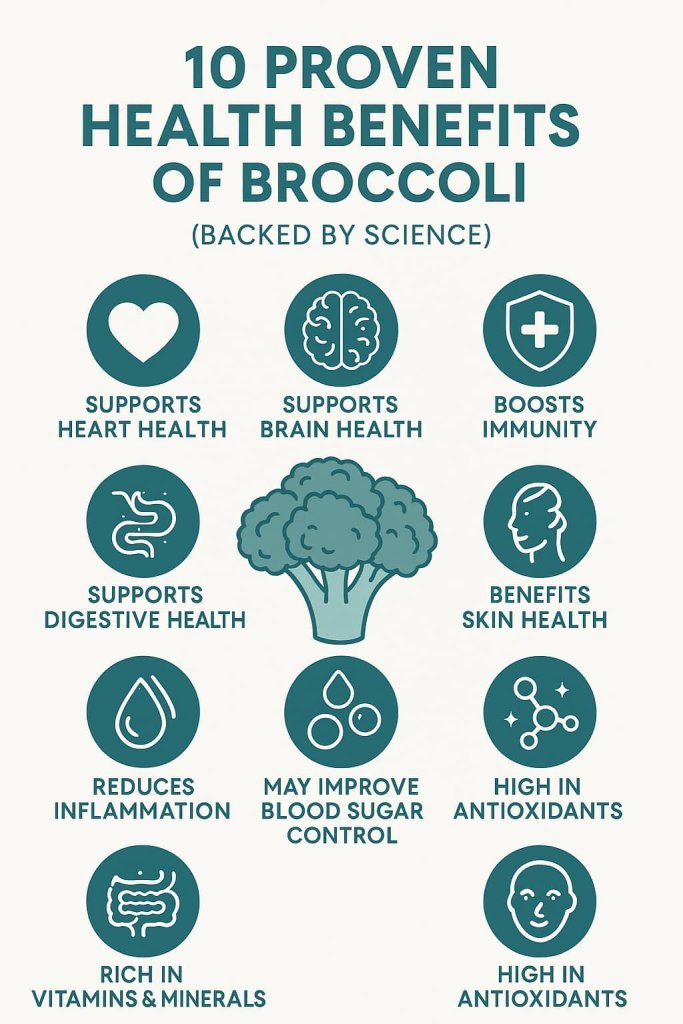
Below are 10 proven health benefits of broccoli — all supported by up-to-date scientific research and nutritional data.
What Is Broccoli? (Overview and Nutrition Profile)
Broccoli (Brassica oleracea var. italica) is a nutrient-rich green vegetable belonging to the cruciferous (Brassicaceae) family, which also includes kale, cauliflower, and Brussels sprouts. Native to the Mediterranean, broccoli has been cultivated for over 2,000 years and is now one of the most widely studied vegetables for its nutritional and bioactive properties.
Broccoli is often praised as a “functional food” because it’s not only low in calories but also exceptionally high in micronutrients and protective plant compounds. It is commonly consumed steamed, roasted, raw, or added to soups and salads, offering both culinary versatility and health benefits.
According to the U.S. Department of Agriculture (USDA) FoodData Central, one cup (91 g) of raw broccoli provides:
| Nutrient | Amount | % Daily Value (DV) |
|---|---|---|
| Calories | 31 | — |
| Protein | 2.5 g | 5% |
| Fiber | 2.4 g | 9% |
| Vitamin C | 81 mg | 90% |
| Vitamin K | 92 µg | 77% |
| Folate | 57 µg | 14% |
| Potassium | 288 mg | 6% |
| Calcium | 43 mg | 4% |
| Iron | 0.7 mg | 4% |
Broccoli’s vibrant green color comes from chlorophyll, while its slightly bitter flavor is due to glucosinolates — sulfur-containing compounds that convert into bioactive isothiocyanates like sulforaphane when chopped or chewed.
These compounds have been the focus of numerous studies for their potential to support antioxidant defense, detoxification, and metabolic wellness (Frontiers in Pharmacology, 2023).
Broccoli is also included in the Dietary Guidelines for Americans (2025–2030) as part of the “dark-green vegetable subgroup,” recommended for regular consumption due to its high nutrient density and low calorie content.
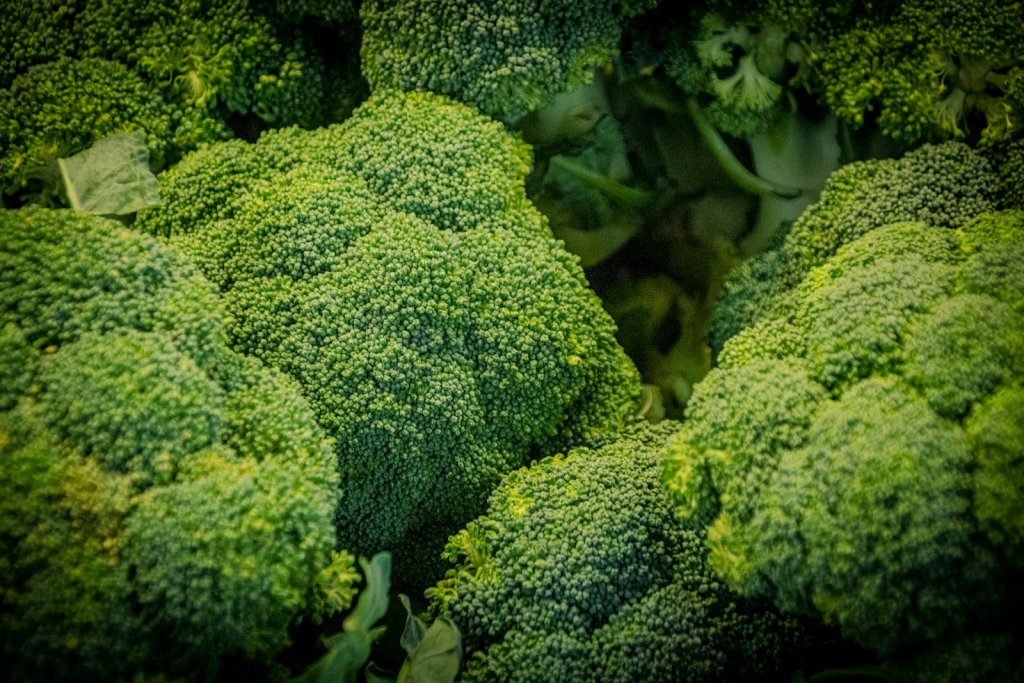
10 Proven Health Benefits of Broccoli (Backed by Science)
Broccoli is a cruciferous vegetable loaded with vitamins, minerals, and bioactive compounds that support multiple aspects of health.
Scientific research consistently shows that regular broccoli consumption may help protect against oxidative stress, support heart and digestive health, and promote overall well-being.
1. Rich in Essential Nutrients
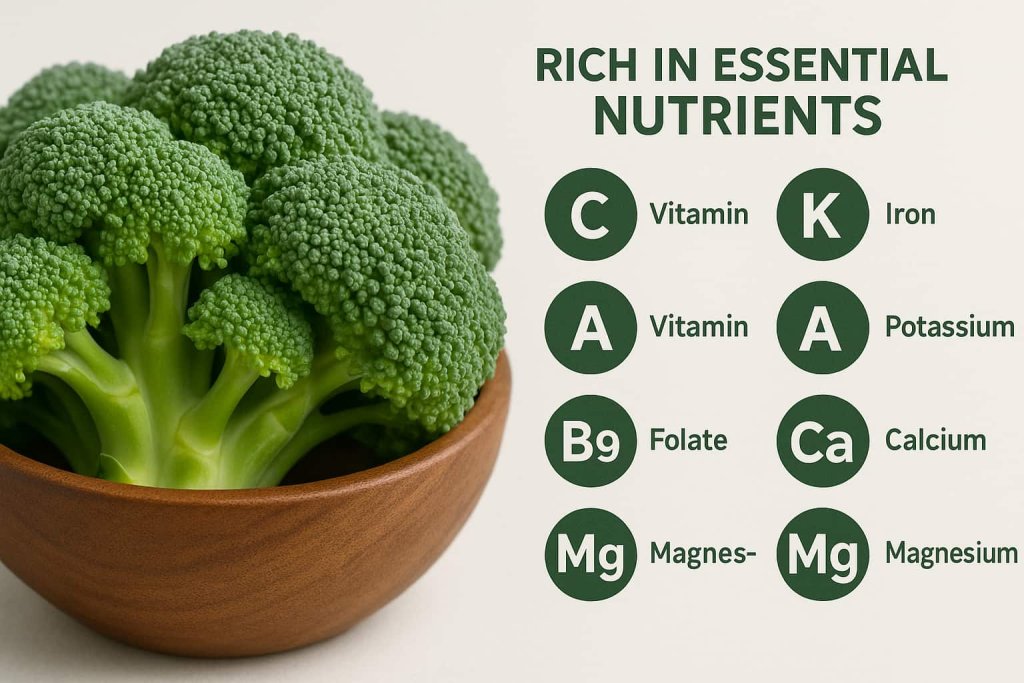
Broccoli provides a powerful combination of vitamins, minerals, and phytonutrients essential for daily wellness.
According to the U.S. Department of Agriculture (USDA) FoodData Central, one cup (91 g) of raw broccoli contains:
| Nutrient | Amount | % Daily Value (DV) |
|---|---|---|
| Calories | 31 | — |
| Vitamin C | 81 mg | 90% |
| Vitamin K | 92 µg | 77% |
| Folate | 57 µg | 14% |
| Fiber | 2.4 g | 9% |
| Potassium | 288 mg | 6% |
These nutrients work together to support immune defense, bone strength, and healthy cell activity. Vitamin C promotes collagen synthesis, vitamin K supports blood clotting and bone metabolism, and folate aids DNA repair — all key for daily metabolic health.
2. Provides Powerful Antioxidant Protection

Broccoli is rich in antioxidants such as vitamin C, flavonoids, carotenoids, and sulforaphane — compounds that help protect cells from oxidative damage.
A 2024 review in Molecules (MDPI) emphasized that isothiocyanates like sulforaphane can activate detoxification enzymes and reduce oxidative stress markers.
These antioxidant mechanisms may help support cellular resilience, healthy aging, and the body’s natural defense systems.
3. Supports Heart Health
Regular broccoli consumption may support cardiovascular wellness through its fiber, potassium, and antioxidant content.
Soluble fiber helps maintain healthy cholesterol levels, while potassium supports normal blood pressure regulation.
According to the American Heart Association, vegetables like broccoli form part of a heart-healthy diet that can help maintain optimal vascular function and lower cardiovascular risk over time.
4. May Support Blood Sugar Balance
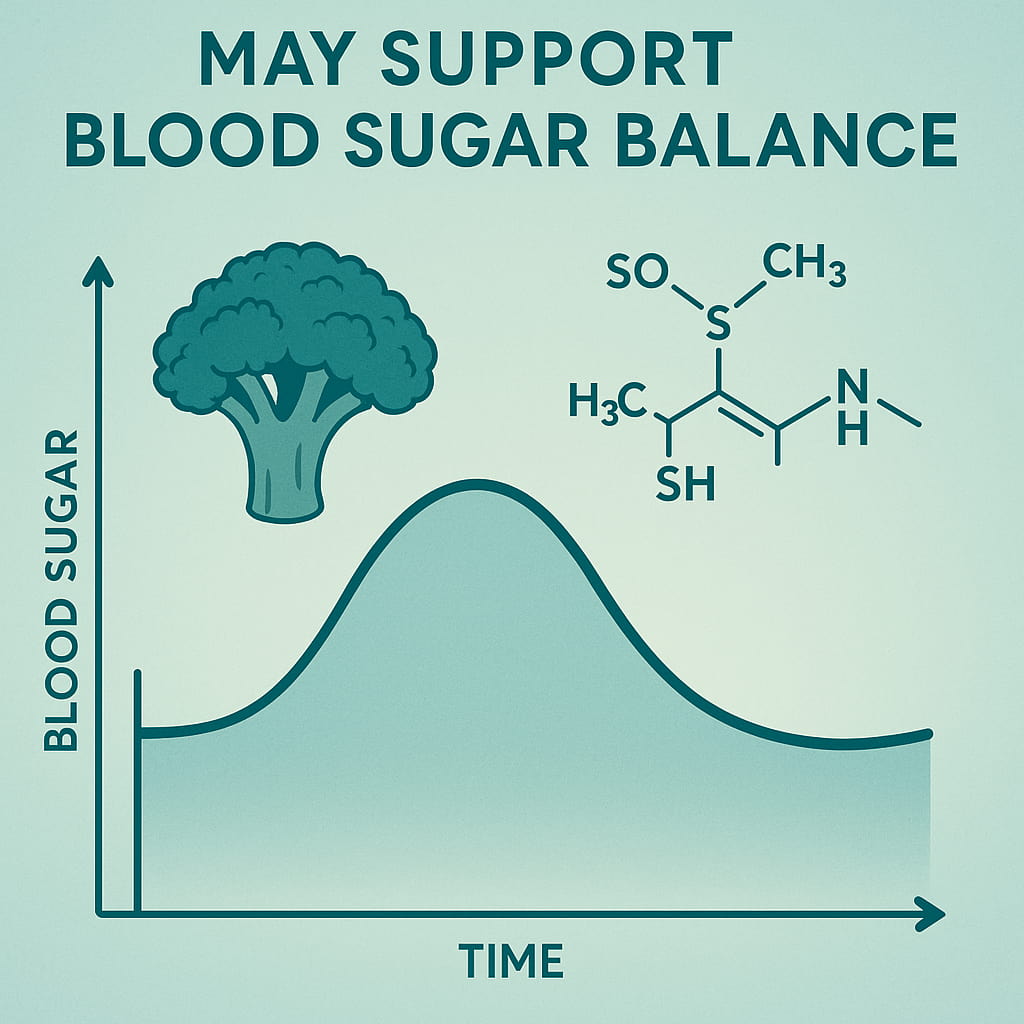
Compounds in broccoli, particularly sulforaphane, may support metabolic health by helping maintain stable blood glucose levels.
A 2025 study highlighted by ScienceDaily found that broccoli sprout extract improved fasting blood sugar in adults with prediabetes, suggesting potential benefits for metabolic balance.
Additionally, its fiber slows carbohydrate digestion, promoting steady energy release throughout the day.
5. Promotes Healthy Digestion
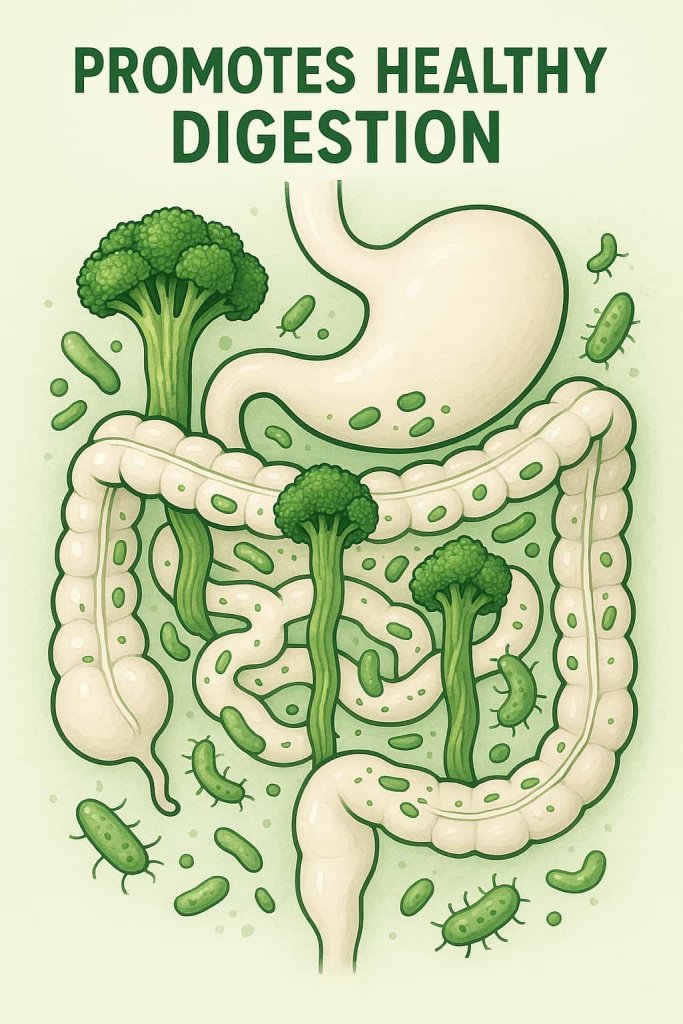
Broccoli is a natural source of dietary fiber that supports gut motility and a balanced microbiome.
According to Frontiers in Nutrition (2024), cruciferous vegetables contribute beneficial prebiotics that encourage the growth of gut-friendly bacteria, such as Lactobacillus and Bifidobacterium.
A healthy gut microbiota not only supports digestion but also influences immune and metabolic health.
6. May Support Immune Function
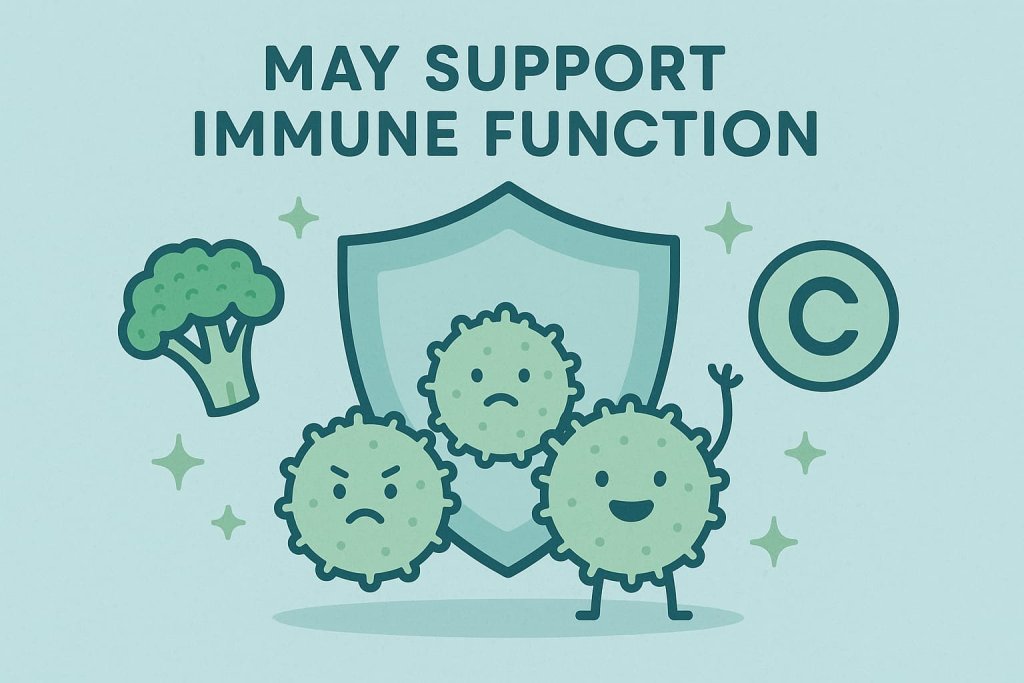
With high vitamin C and plant phytonutrients, broccoli strengthens the body’s immune defenses.
Vitamin C enhances white blood cell activity and protects cells from oxidative damage.
The National Institutes of Health (NIH) Office of Dietary Supplements notes that vitamin C–rich foods like broccoli contribute to immune resilience and faster recovery from oxidative stress caused by daily environmental exposure.
7. Supports Bone and Joint Health
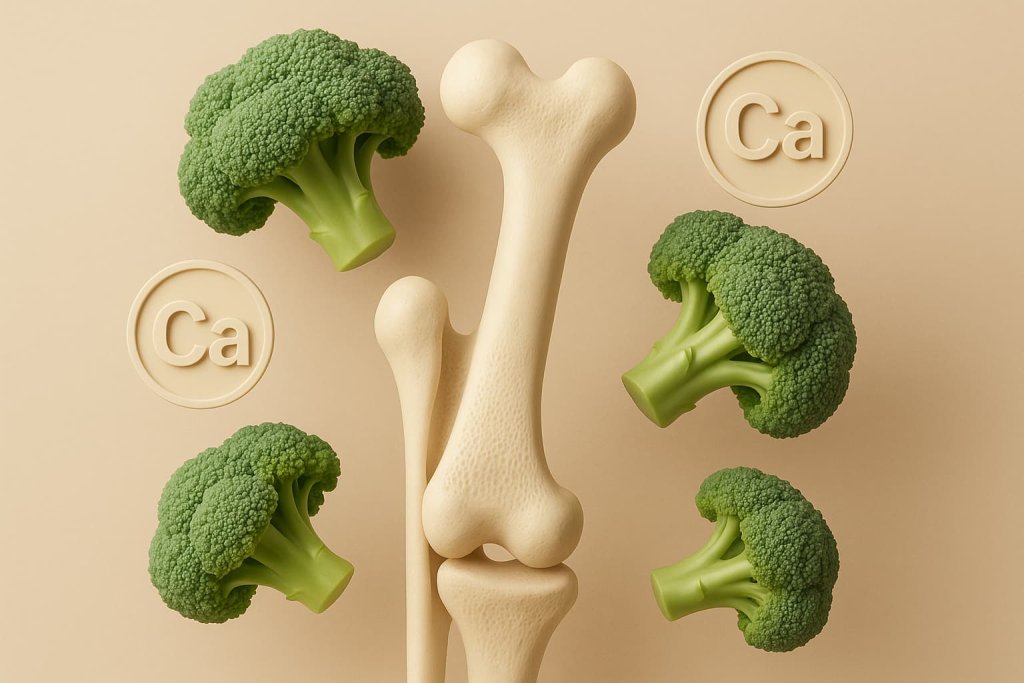
Broccoli offers several bone-supportive nutrients, including vitamin K, calcium, phosphorus, and magnesium.
Vitamin K plays an essential role in bone mineralization, while calcium and magnesium support skeletal structure.
The Harvard T.H. Chan School of Public Health reports that regular intake of green vegetables like broccoli is linked with better bone mineral density and reduced fracture risk in older adults.
8. May Support Brain and Cognitive Function
Sulforaphane and vitamin K in broccoli contribute to cognitive and nervous system health.
A 2024 article in the Journal of Agricultural and Food Chemistry noted that sulforaphane may support antioxidant pathways in brain tissue and help protect neurons from oxidative stress.
While more human studies are needed, these findings suggest broccoli’s nutrients may help maintain cognitive clarity and support brain aging.
9. May Support Healthy Skin and Detoxification

Broccoli supports skin and liver health through its unique combination of antioxidants, vitamins, and phytonutrients. One of its key compounds — glucoraphanin — converts into sulforaphane during digestion. Sulforaphane has been shown in clinical and experimental studies to support the body’s natural detoxification enzymes, helping neutralize and eliminate metabolic byproducts through the liver’s Phase II detox system (Frontiers in Pharmacology, 2023).
In addition, broccoli is rich in vitamin C, an essential nutrient that supports collagen synthesis, which helps maintain firm, smooth, and resilient skin. Its vitamin E, beta-carotene, and polyphenols further act as antioxidants, reducing oxidative stress that contributes to visible skin aging.
According to the Cleveland Clinic, broccoli’s combination of fiber, vitamins, and plant compounds supports both internal detox pathways (via liver enzyme activity) and external skin vitality (through enhanced antioxidant protection). Regular consumption — whether steamed, roasted, or raw — can help nourish skin from within while supporting overall metabolic health.
10. May Reduce Cancer Risk Factors
Several population studies suggest that diets rich in cruciferous vegetables like broccoli are linked to lower risks of certain cancers, including colorectal and breast cancers.
According to the National Cancer Institute, broccoli’s compounds — such as sulforaphane and indole-3-carbinol — support natural detoxification enzymes that help protect DNA from oxidative stress and maintain normal cellular health.
These effects reinforce broccoli’s role as part of a balanced, plant-forward dietary pattern associated with long-term wellness.
How to Eat Broccoli for Maximum Benefit
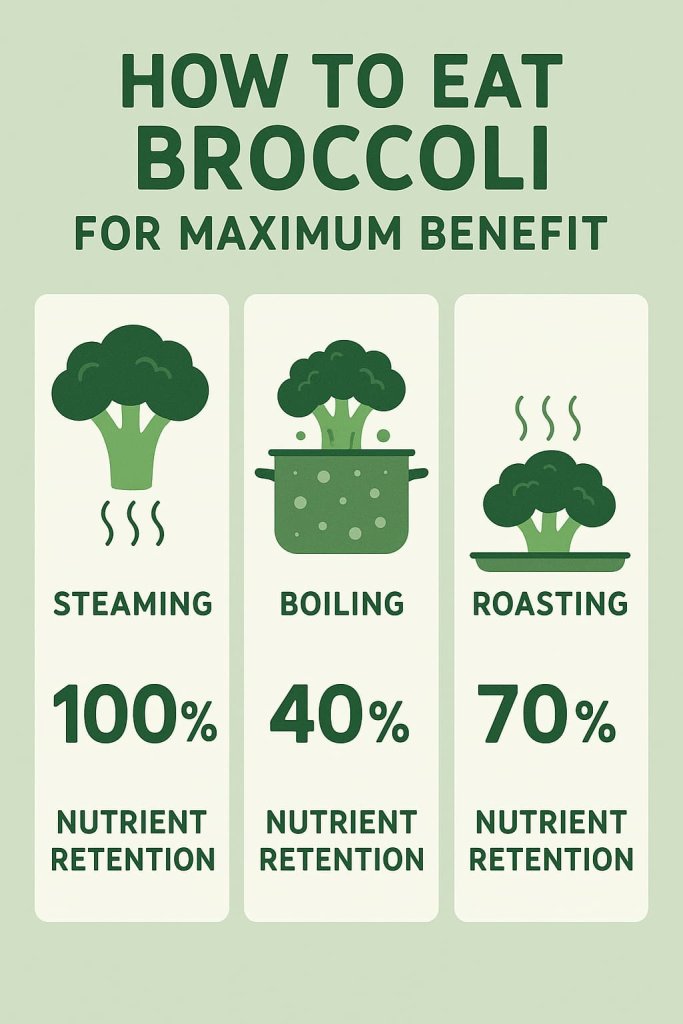
To get the most nutrients and flavor from broccoli, how you prepare and combine it matters. Proper cooking methods help preserve its antioxidants, vitamins, and key bioactive compounds like sulforaphane, which may be lost during overcooking.
Best cooking methods:
- Steam lightly (3–5 minutes): Retains the highest levels of vitamin C, glucosinolates, and sulforaphane.
- Stir-fry or roast briefly: Enhances flavor while maintaining texture and nutrients.
- Avoid over-boiling: Prolonged boiling can leach water-soluble vitamins and reduce phytochemical content.
- Combine with mustard seeds or radishes: These contain the enzyme myrosinase, which helps convert inactive glucoraphanin into active sulforaphane.
- Pair with healthy fats: Olive oil or avocado may improve absorption of broccoli’s fat-soluble antioxidants like beta-carotene and vitamin E.
According to Verywell Health, steaming or microwaving broccoli for a short time preserves its beneficial compounds better than boiling or frying.
Practical tip: Eat both florets and stalks — the stalks are rich in fiber and nutrients often discarded during prep.
Possible Side Effects and Precautions
Broccoli is generally safe and well-tolerated, but moderation and awareness of individual conditions are important — especially dietary guidance.
1. Digestive discomfort:
Broccoli contains fiber and raffinose, a carbohydrate that may cause mild gas or bloating when consumed in large amounts. Gradual intake and thorough cooking can reduce this effect.
2. Vitamin K and blood-thinning medications:
Broccoli is naturally high in vitamin K, which plays a role in blood clotting. People taking anticoagulants such as warfarin should maintain a consistent vitamin K intake to avoid interactions.
3. Thyroid sensitivity (goitrogens):
Broccoli contains goitrogenic compounds that may interfere with thyroid hormone production if eaten in very large raw amounts, especially in people with iodine deficiency. For most individuals, it is safe and highly nutritious when consumed in normal portions. Cooking—particularly steaming or sautéing—greatly reduces goitrogen activity and preserves key nutrients. Maintaining adequate iodine intake through iodized salt or seafood supports healthy thyroid function. The U.S. Food and Drug Administration (FDA) recommends consulting a healthcare professional before dietary or medication changes to prevent nutrient interactions.
Frequently Asked Questions (FAQ)
1. How much broccoli should I eat per week?
About 1–2 cups several times a week fits into a balanced diet and supports nutritional variety.
2. Is raw broccoli better than cooked?
Lightly steamed broccoli often provides a better balance — it improves sulforaphane activation while preserving vitamin C.
3. Can broccoli help with weight management?
Yes. Its fiber and low-calorie content promote satiety and balanced energy intake.
4. Are broccoli sprouts healthier than mature broccoli?
Broccoli sprouts contain higher concentrations of sulforaphane — up to 10–20 times more than mature broccoli.
5. Can people with thyroid conditions eat broccoli?
Yes, in moderation. Cooking reduces compounds that may interfere with iodine uptake.
6. Is frozen broccoli as healthy as fresh?
Yes. Frozen broccoli retains most nutrients if stored properly and lightly steamed before eating.
7. Can children eat broccoli daily?
Yes. It’s safe and nutrient-dense, supporting growth and immune function when served in age-appropriate portions.
Conclusion
Broccoli remains one of the most nutrient-dense and scientifically supported vegetables for overall health. Rich in vitamins C and K, antioxidants, fiber, and unique phytochemicals like sulforaphane, it may support cardiovascular wellness, digestion, immunity, and cellular protection.
Incorporate broccoli into meals regularly — steamed, roasted, or blended into soups and smoothies — to enjoy its full nutritional benefits. For optimal wellness, combine it with other colorful vegetables and whole foods as part of a balanced diet.
This content is for informational purposes only and not medical advice.
